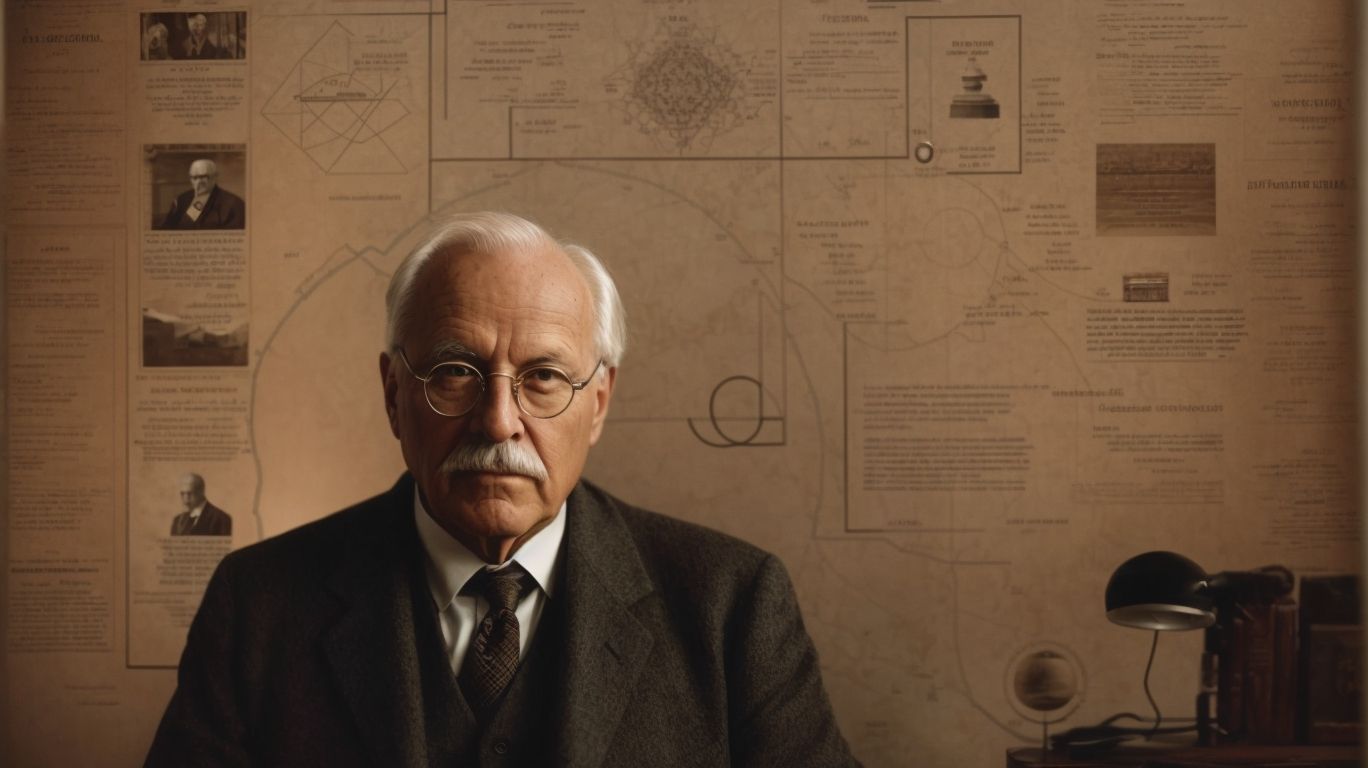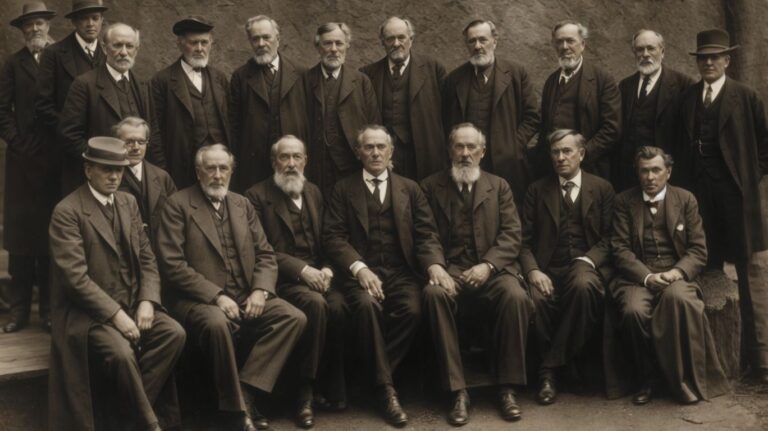Carl Jung, a prominent figure in the field of psychology, is known for his groundbreaking work in analytical psychology. This article will explore who Carl Jung was and the key concepts of Jungian psychology. These include the collective unconscious, archetypes, individuation, and synchronicity. We will also discuss the impact of his work on the field of psychology.
Additionally, we will address the criticisms Jung’s ideas faced and how his work continues to influence psychology today. This includes its applications in therapy and its relevance in understanding human behavior and culture.
Contents
- 1 Key Takeaways:
- 2 Who is Carl Jung?
- 3 What is Analytical Psychology?
- 4 What are the Key Concepts of Jungian Psychology?
- 5 How Did Carl Jung Influence the Field of Psychology?
- 6 What Criticisms Did Jung’s Ideas Face?
- 7 How Does Jung’s Work Continue to Impact Psychology Today?
- 8 Frequently Asked Questions
- 8.1 What are Carl Jung’s main contributions to psychology?
- 8.2 How did Carl Jung’s ideas differ from Sigmund Freud’s?
- 8.3 What is the collective unconscious and how did Jung contribute to its understanding?
- 8.4 How did Carl Jung’s contributions impact the field of psychology?
- 8.5 What is an archetype and how did Jung define it?
- 8.6 How did Carl Jung’s theories on extroversion and introversion contribute to our understanding of personality?
Key Takeaways:
- Carl Jung’s contributions to psychology include his theory of analytical psychology, key concepts such as the collective unconscious and individuation, and his impact on the field of psychology.
- Jung’s influence can be seen in personality theory, psychotherapy, and art and literature, but his ideas also faced criticisms for lack of empirical evidence and controversies surrounding his theories on religion.
- Today, Jung’s work continues to impact psychology through its applications in therapy, influence on other theories and approaches, and relevance in understanding human behavior and culture.
Who is Carl Jung?
Carl Jung, born on July 26, 1875, in Switzerland, was a prominent Swiss psychiatrist and psychoanalyst who founded analytical psychology.
After earning his medical degree from the University of Basel, he furthered his studies at the University of Zurich, where he developed a keen interest in the field of psychiatry.
Jung’s association with Sigmund Freud greatly influenced his early work, and he eventually became one of the most significant figures in the development of psychoanalysis.
His contributions to analytical psychology, notably the concepts of complexes and the collective unconscious, revolutionized the understanding of the human psyche and greatly impacted the fields of psychology and psychiatry.
What is Analytical Psychology?
Analytical psychology, developed by Carl Jung, is a comprehensive psychological approach that emphasizes the exploration of the individual’s unconscious psyche and the integration of conflicting aspects of the personality.
What are the Key Concepts of Jungian Psychology?
Jungian psychology encompasses several key concepts, including the collective unconscious, archetypes, individuation, and synchronicity, which form the core pillars of this psychological framework.
The collective unconscious represents the inherited reservoir of human experience and includes the universality of certain symbols and motifs that are passed down through generations, influencing human behavior and thought processes.
On the other hand, archetypes are fundamental universal symbols that reflect common human experiences and comprise the Anima/Animus, the Shadow, and the Self.
Moreover, individuation refers to the process of integrating the conscious and unconscious aspects of the psyche to achieve self-realization and wholeness.
Synchronicity, a concept introduced by Jung, describes meaningful coincidences that cannot be explained by cause and effect, but rather by the connectedness of events in the world.
The Collective Unconscious
The collective unconscious, proposed by Jung, represents the universal, inherited reservoir of human experiences and symbols that influence an individual’s perceptions and behavior.
This concept suggests that beyond the individual’s personal unconscious, there exists a deeper level of the unconscious mind shared by all human beings, transcending cultural and societal boundaries.
Through archetypes and primordial images, the collective unconscious shapes and influences an individual’s thoughts, emotions, and behaviors, often manifesting in dreams, myths, and cultural symbols.
Moreover, Carl Jung believed that an individual’s interaction with the collective unconscious is pivotal in the process of individuation, the journey towards self-realization and wholeness.
The collective unconscious plays a significant role in shaping cultural practices, belief systems, and societal dynamics, offering valuable insights into the human psyche and behaviors.
Archetypes
Archetypes, as defined by Jung, are psychological representations of universal themes and motifs that manifest as symbolic patterns in the human psyche and collective culture.
These symbolic patterns are deeply ingrained in the human experience, influencing our thoughts, emotions, and behaviors at a subconscious level.
They appear in myths, religion, art, and literature, embodying fundamental human experiences such as the hero’s journey, the wise old man, the mother figure, and the shadow self.
These archetypes serve as powerful psychological forces, shaping our perceptions and guiding our actions, often without our conscious awareness.
Individuation
Individuation, a core concept in Jungian psychology, signifies the process of psychological integration and self-realization, leading to the development of a balanced and whole personality.
This process involves the exploration and integration of both the conscious and unconscious elements of an individual’s psyche.
Through self-reflection, introspection, and confronting the shadow aspects, individuals can achieve a deeper understanding of themselves, leading to a profound transformation.
This journey towards individuation often involves confronting and transcending societal and cultural expectations, allowing individuals to embrace their authentic selves and live in alignment with their true values and potentials.
Synchronicity
Synchronicity, a concept introduced by Jung, refers to the occurrence of meaningful coincidences that are not causally related but hold significance for the individual’s psychological experiences and development.
This concept delves into the interconnectedness of events and the deep-seated universal principles governing human existence. It suggests that these meaningful coincidences reflect the underlying patterns and connections in the collective unconscious, serving as symbolic messages or affirmations of one’s path in life.
By recognizing and interpreting these synchronicities, individuals can gain profound insights into their inner world and the broader cosmic order.
Synchronicity challenges the conventional cause-and-effect paradigm in psychology, offering a holistic perspective that integrates the subjective experiences and the external world.
Its influence extends to various therapeutic approaches, enriching the understanding of human consciousness and the non-linear nature of reality.
How Did Carl Jung Influence the Field of Psychology?
Carl Jung made profound contributions to the field of psychology, significantly impacting personality theory, psychotherapy, and the realms of art and literature through his innovative concepts and therapeutic approaches.
Contributions to Personality Theory
Jung’s contributions to personality theory include the development of psychological types, the concepts of introversion and extroversion, and the exploration of the collective unconscious as influential factors in shaping individual personalities.
Jung proposed that individuals possess innate psychological predispositions that influence their experiences, behaviors, and interactions.
He identified eight psychological types, which encompass characteristic patterns of thinking, feeling, and behaving.
The concepts of introversion and extroversion represent these fundamental orientations, highlighting the outward or inward focus of an individual’s energy.
These concepts significantly impact how individuals approach social interactions, decision-making processes, and their overall engagement with the external world.
Impact on Psychotherapy
Jung’s influence on psychotherapy is evident through the development of analytical psychology, his emphasis on dream analysis, and the symbolic interpretation of the unconscious as integral components of therapeutic practice.
His work laid the foundation for a deeper understanding of the human psyche, emphasizing the collective unconscious and the archetypes.
In therapeutic settings, Jungian analysis often involves exploring the personal and collective unconscious, utilizing symbols as gateways to the unconscious realms. This approach helps individuals uncover and integrate repressed aspects of themselves, leading to a more harmonious inner life.
Influence on Art and Literature
Jung’s influence on art and literature is reflected in the creative utilization of symbolism, mythological motifs, and archetypal themes that resonate with the collective human psyche and cultural expressions.
Artists and writers have drawn from Jung’s concepts to imbue their works with layers of meaning that delve into the depths of the human experience.
Symbolism in particular, has been used to convey subconscious messages and universal truths, connecting the viewer or reader to profound aspects of the human condition.
Additionally, mythological motifs have provided a rich tapestry for creators to weave stories that tap into the timeless aspects of human existence, linking individuals across cultures and generations.
Furthermore, archetypal themes, stemming from Jung’s collective unconscious, have become the foundation for characters and narratives that resonate deeply, transcending time and culture by speaking to fundamental aspects of human nature.
What Criticisms Did Jung’s Ideas Face?
Jung’s ideas encountered criticisms related to the lack of empirical evidence supporting some of his concepts and controversies surrounding his theories on religion and spirituality, despite their profound impact on psychology and culture.
Lack of Empirical Evidence
One of the primary criticisms of Jung’s ideas pertains to the perceived lack of empirical evidence and scientific validation for certain aspects of his theories, leading to skepticism within the academic and scientific communities.
This has led to ongoing debates and discussions about the extent to which Jung’s concepts can be substantiated through empirical research.
Many scholars argue that while Jung’s ideas may hold significant cultural and historical value, they are often difficult to test and measure in a strictly scientific manner.
The absence of concrete empirical evidence has raised doubts about the replicability and generalizability of Jung’s theories in the context of modern scientific standards.
Proponents of Jung’s work emphasize the need for a more expansive and inclusive understanding of what constitutes valid evidence in the realm of psychology, advocating for a holistic approach that considers the interplay of subjective experiences, cultural influences, and symbolic meanings in shaping psychological phenomena.
Controversy Surrounding His Theories on Religion
Jung’s theories on religion and spirituality sparked controversy due to their emphasis on transcendent experiences, symbolic interpretations, and the integration of religious motifs within psychological frameworks, leading to debates within religious and academic spheres.
Many scholars and practitioners in the field of psychology and religion argue that Jung’s emphasis on the transcendent nature of religious experiences brings a complex and ambiguous understanding of spirituality.
Some criticize his interpretation of religious symbols, suggesting that it could oversimplify the rich and diverse tapestry of religious meaning across different cultures.
The integration of religious motifs within psychological frameworks has been met with skepticism by some theologians, who caution against reducing the depth of religious belief to psychological patterns and archetypes.
How Does Jung’s Work Continue to Impact Psychology Today?
Jung’s work continues to exert a profound influence on contemporary psychology through its applications in therapy, contributions to other theories, and its relevance in understanding human behavior and cultural dynamics in the modern context.
Applications in Therapy
Jung’s concepts find practical applications in therapy through the principles of analytical psychology, emphasizing a holistic approach to self-discovery, psychological integration, and the exploration of the unconscious.
Many therapists incorporate Jungian concepts into their practice to help individuals gain a more profound understanding of themselves and their inner conflicts.
By looking into the collective unconscious and archetypes, therapists can assist clients in uncovering repressed emotions and unresolved issues, allowing for personal growth and healing.
The emphasis on wholeness and the connection between the conscious and unconscious aspects of the psyche sets the stage for a comprehensive and transformative therapeutic journey.
Influence on Other Theories and Approaches
Jung’s work has influenced various psychological theories and approaches, including psychodynamic, humanistic, and transpersonal perspectives, shaping contemporary understandings of human experiences and the psyche.
Jung’s theoretical framework emphasized the role of the unconscious mind, the collective unconscious, and archetypes, which have been integrated into psychodynamic approaches, such as Freud’s psychoanalysis.
In humanistic psychology, Jung’s emphasis on individuation and self-realization has provided valuable insights into personal growth and self-actualization. His exploration of spirituality and the transcendent aspects of human nature has significantly influenced transpersonal psychology, broadening the perspective on human experiences and the psyche.
Relevance in Understanding Human Behavior and Culture
Jung’s concepts retain relevance in understanding modern human behavior and cultural dynamics, offering insights into societal and individual complexities, and enriching contemporary psychological perspectives.
His exploration of the collective unconscious, archetypes, and the process of individuation continue to shed light on the underlying motivations and belief systems that drive human behavior.
These concepts provide a framework for comprehending the intricacies of cultural dynamics, allowing us to delve into the shared symbols, myths, and rituals that shape collective identities.
Jung’s emphasis on the integration of the conscious and unconscious aspects of the psyche offers a valuable lens through which to explore the complexities of individual experiences in today’s multifaceted world.
Frequently Asked Questions
What are Carl Jung’s main contributions to psychology?
Carl Jung is best known for his theories on analytical psychology, specifically his concept of the collective unconscious and archetypes. He also introduced the concepts of extroversion and introversion, and emphasized the importance of dreams and the unconscious in understanding the psyche.
How did Carl Jung’s ideas differ from Sigmund Freud’s?
While both Jung and Freud were influential figures in the field of psychology, their ideas differed in several key ways. Jung rejected Freud’s emphasis on sexuality and the Oedipus complex, and instead focused more on the spiritual and symbolic aspects of the psyche.
What is the collective unconscious and how did Jung contribute to its understanding?
The collective unconscious is the idea that all humans share a universal, inherited unconscious that is filled with archetypes and symbols. Jung’s work on dream analysis and his exploration of symbols and mythology greatly contributed to our understanding of the collective unconscious.
How did Carl Jung’s contributions impact the field of psychology?
Jung’s contributions to psychology greatly expanded the understanding of the human psyche and influenced many areas of psychology, including psychotherapy, personality theory, and dream interpretation. His ideas also had a significant impact on fields such as literature, art, and anthropology.
What is an archetype and how did Jung define it?
An archetype is a universal symbol or pattern that is present in the collective unconscious. Jung believed that these archetypes, such as the hero, mother, and wise old man, are innately understood and can manifest in various forms in our lives and dreams.
How did Carl Jung’s theories on extroversion and introversion contribute to our understanding of personality?
Jung’s concept of extroversion and introversion, which he believed were innate personality orientations, greatly contributed to the study of personality. This idea has been expanded upon and is still widely used in personality assessments and psychological research today.




